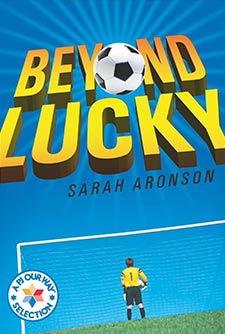Death by Toilet Paper
Did you know that the average life expectancy of a toilet is 50 years? Benjamin Epstein knows a lot of random facts and loves to enter contests. But will all of his get-rich-quick schemes and contests earn enough money to save his family from eviction?
Average Rating
( hint: Login to leave a review! )
336 Reviews
Leave Review
What the Book is About
Jewish Content & Values
Positive Role Models
Content Advisory
Talk it Over!
More for You
Benjamin Epstein is having a tough seventh grade year. His father died, leaving the family with serious financial issues, and he and his mom are about to be evicted from their apartment. To further complicate matters, Ben’s Zeyde, who has memory problems, is his new roommate—and he snores! Ben has all kinds of creative get-rich-quick schemes involving various contests and sweepstakes, but can he really make enough money to pay the back rent?
This book is full of fun and goofy facts about toilet paper, however, it also deals with serious issues. This aspect of the book is at odds with the cover, which gives the impression that it is a light read with lots of kid-style humor. While the book certainly is amusing, it is not all lighthearted.
- Yiddish words used throughout the book are defined in a glossary, and there are a few mentions of Jewish traditions like Shiva and Hanukkah as well.
- Tzedaka: Mr. Taylor epitomizes the Jewish tradition of giving charity with dignity when he sends Ben’s friend, Toothpick, to school with lunches packed with extra food for Ben, and when he offers Ben lasagna to take home, insisting that it’s extra, but knowing that in Ben’s house, food is scarce.
- Caring for widows and orphans: Mrs. Schnekle, a widow herself, scrupulously practices the commandment to care for widows and orphans (Exodus 22-21-24). She looks out for Ben and his mother, brings them home cooked meals, and speaks out on their behalf to Mr. Katz, the landlord.
- Benjamin internalizes his family’s financial struggles and works hard to improve the situation. He is a responsible boy who respects and appreciates his mom, his Zeyde, and Mrs. Schnekle.
- Mrs. Schnekle is a kindhearted and generous neighbor who supports the Epstein family both practically and emotionally. She even finds a solution for Zeyde’s ever-worsening Alzheimer’s.
- Zeyde is a loving and thoughtful grandfather. He sincerely regrets causing the family pain when his memory fails, and he is a really good sport, agreeing to model a toilet paper wedding dress for a competition.
This book touches on difficult issues such as poverty, Alzheimer’s disease, mourning, and aging in a kid-friendly, realistic way. Some kids may feel sad reading about a child who has lost a parent, is facing eviction, and sometimes doesn’t get enough to eat. However, Ben’s likeable personality and the happy ending serve as a pleasant contrast to the (sometimes) grim realities of Ben’s life.
Even though he’s just a kid, Ben feels responsible for helping out his mom by earning money to help pay the rent. Do you have an important job in your family? What are some of your responsibilities?
Naming in Jewish Tradition:
At the end of the book, Ben names his new goldfish after his pen pal, Ed. In Jewish tradition, it’s customary to name a child in memory of a relative. In Sephardic tradition, children are often named after their living grandparents; in Ashkenazic tradition, children are usually named in memory of a loved one who has already passed on. Many believe that the shared name creates a metaphysical bond between the two souls, inspiring the child to adopt the good qualities of her namesake, while the soul of the departed intercedes in heaven on behalf of the child, thus paving the way for an easier life. The Talmud implies that baby names are divinely suggested and that expectant parents receive some measure of prophecy when choosing their child’s name.
At the end of the book, Ben names his new goldfish after his pen pal, Ed. In Jewish tradition, it’s customary to name a child in memory of a relative. In Sephardic tradition, children are often named after their living grandparents; in Ashkenazic tradition, children are usually named in memory of a loved one who has already passed on. Many believe that the shared name creates a metaphysical bond between the two souls, inspiring the child to adopt the good qualities of her namesake, while the soul of the departed intercedes in heaven on behalf of the child, thus paving the way for an easier life. The Talmud implies that baby names are divinely suggested and that expectant parents receive some measure of prophecy when choosing their child’s name.
What the Book is About
Benjamin Epstein is having a tough seventh grade year. His father died, leaving the family with serious financial issues, and he and his mom are about to be evicted from their apartment. To further complicate matters, Ben’s Zeyde, who has memory problems, is his new roommate—and he snores! Ben has all kinds of creative get-rich-quick schemes involving various contests and sweepstakes, but can he really make enough money to pay the back rent?
This book is full of fun and goofy facts about toilet paper, however, it also deals with serious issues. This aspect of the book is at odds with the cover, which gives the impression that it is a light read with lots of kid-style humor. While the book certainly is amusing, it is not all lighthearted.
Jewish Content & Values
- Yiddish words used throughout the book are defined in a glossary, and there are a few mentions of Jewish traditions like Shiva and Hanukkah as well.
- Tzedaka: Mr. Taylor epitomizes the Jewish tradition of giving charity with dignity when he sends Ben’s friend, Toothpick, to school with lunches packed with extra food for Ben, and when he offers Ben lasagna to take home, insisting that it’s extra, but knowing that in Ben’s house, food is scarce.
- Caring for widows and orphans: Mrs. Schnekle, a widow herself, scrupulously practices the commandment to care for widows and orphans (Exodus 22-21-24). She looks out for Ben and his mother, brings them home cooked meals, and speaks out on their behalf to Mr. Katz, the landlord.
Positive Role Models
- Benjamin internalizes his family’s financial struggles and works hard to improve the situation. He is a responsible boy who respects and appreciates his mom, his Zeyde, and Mrs. Schnekle.
- Mrs. Schnekle is a kindhearted and generous neighbor who supports the Epstein family both practically and emotionally. She even finds a solution for Zeyde’s ever-worsening Alzheimer’s.
- Zeyde is a loving and thoughtful grandfather. He sincerely regrets causing the family pain when his memory fails, and he is a really good sport, agreeing to model a toilet paper wedding dress for a competition.
Content Advisory
This book touches on difficult issues such as poverty, Alzheimer’s disease, mourning, and aging in a kid-friendly, realistic way. Some kids may feel sad reading about a child who has lost a parent, is facing eviction, and sometimes doesn’t get enough to eat. However, Ben’s likeable personality and the happy ending serve as a pleasant contrast to the (sometimes) grim realities of Ben’s life.
Talk it Over!
Even though he’s just a kid, Ben feels responsible for helping out his mom by earning money to help pay the rent. Do you have an important job in your family? What are some of your responsibilities?
More for You
Naming in Jewish Tradition:
At the end of the book, Ben names his new goldfish after his pen pal, Ed. In Jewish tradition, it’s customary to name a child in memory of a relative. In Sephardic tradition, children are often named after their living grandparents; in Ashkenazic tradition, children are usually named in memory of a loved one who has already passed on. Many believe that the shared name creates a metaphysical bond between the two souls, inspiring the child to adopt the good qualities of her namesake, while the soul of the departed intercedes in heaven on behalf of the child, thus paving the way for an easier life. The Talmud implies that baby names are divinely suggested and that expectant parents receive some measure of prophecy when choosing their child’s name.
At the end of the book, Ben names his new goldfish after his pen pal, Ed. In Jewish tradition, it’s customary to name a child in memory of a relative. In Sephardic tradition, children are often named after their living grandparents; in Ashkenazic tradition, children are usually named in memory of a loved one who has already passed on. Many believe that the shared name creates a metaphysical bond between the two souls, inspiring the child to adopt the good qualities of her namesake, while the soul of the departed intercedes in heaven on behalf of the child, thus paving the way for an easier life. The Talmud implies that baby names are divinely suggested and that expectant parents receive some measure of prophecy when choosing their child’s name.



